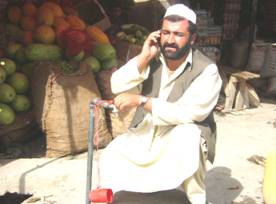
Water utilities in Afghanistan struggle to provide quality service to their customers. They lack adequate infrastructure, equipment, and staffing, and they do not have the financial resources to make the necessary improvements in these areas. The level of service has been so poor in some areas that residents drill their own private wells if they want water piped into their homes or businesses, even if they already have a public water connection. Dissatisfied with their service, many citizens have stopped paying their water bills. But water utilities cannot provide better service when customers do not pay their bills. It’s a vicious cycle.
ICMA has been helping water utilities in four cities to provide better service through the Commercialization of Afghanistan Water and Sanitation Activity (CAWSA) program, funded by the U.S. Agency for International Development. The goal of the program is to make each utility a self-sustaining commercial enterprise that will eventually earn sufficient revenues to cover all operating costs, expand services, and provide safe drinking water to all customers.
In 2009, ICMA’s CAWSA team began working in Gardez, a city of 70,000 in eastern Afghanistan, and assisting the Gardez Water Supply Department (GWSD), a business unit of the Afghan Urban Water Supply and Sewerage Company (AUWSSC). GWSD’s collection of accounts receivable was deficient for many years due to its inconvenient office location, inadequate communication with customers, and a poor public image that did not promote or proactively facilitate on-time payment of water bills.
Using basic management audit techniques, the CAWSA team worked with GWSD Director Gul Marjan and his administrative team to identify illegal and non-paying customers, prioritize collection of past-due accounts, and computerize all customer records, payment history, and financial reports. CAWSA provided interns to support the understaffed GWSD in addressing the collections backlog, meter reading, and improving overall commercial performance.
While these steps have improved efficiencies, Director Marjan believes that superior customer service is what will ultimately encourage customers to pay their bills on time and help the utility achieve financial viability. In response, CAWSA worked with GWSD to utilize the project’s small grants component to construct a convenient customer care building in the center of Gardez City close to the local bank, where people pay their bills. This new customer care office is equipped with modern computers, printing and scanning facilities, and related office equipment. It houses the new Gardez 24-hour telephone hotline system, supported by Internet communications sufficient to receive, respond to, and track service requests of all customers. Now GWSD customers are only a phone call away from their water service and the customer care office has become a convenient one-stop-shop for access to all water supply services.
Director Marjan credits community partnerships with the rapid success of the hotline. Meter readers, local media, village leaders, mullahs, and village Shurahs have enthusiastically supported the hotline and distributed its contact numbers throughout the city.
The CAWSA/GWSD collaborative effort has paid off. Customers now receive convenient access, first-class communications, and on-time service. Customer satisfaction has improved and revenue collection has increased by 13%, including the collection of more than 400,000 Afs ($8,700) from delinquent customers, some of whom had not paid bills in 10 years. With this improvement, GWSD cost coverage jumped from 32% to 68% as of June 2010. Their long-term goal is to meet the AUWSSC performance target of covering 85% of all operating costs by 2013.
Gardez is one of four cities in Afghanistan that ICMA is assisting through the CAWSA program. Focused on improving capacity building and customer service, CAWSA has produced similar results with water utilities in Jalalabad, Ghazni, and Mazar-e-Sharif. The Jalalabad Strategic Business Unit (JSBU) has reported a 10% increase in revenues. The Ghazni Water Supply Department (GhWSD) reports a revenue collections jump of 25% and on-time payment of bills rose from 48% to 76%. And they have already exceeded the AUWSSC target by collecting almost 90% of operating costs.
On August 4, 2010, the Mazar-e-Sharif Strategic Business Unit inaugurated the opening of a fully-equipped, modern customer care center and administrative offices. Embracing the new concept of customer service in Afghanistan, Director Abdul Jamil Maseh declared at the inauguration ceremony, “The customer comes first.”
New, Reduced Membership Dues
A new, reduced dues rate is available for CAOs/ACAOs, along with additional discounts for those in smaller communities, has been implemented. Learn more and be sure to join or renew today!
